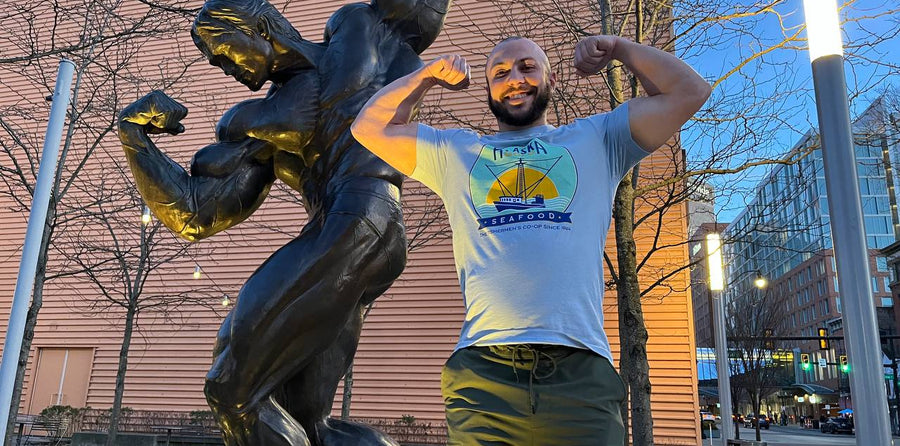
GUEST BLOG POST!
Strongman and strength and conditioning coach Alec Petrone has been a loyal Alaska Gold Seafood customer since 2017. He gets our sablefish, rockfish, keta salmon, canned tuna, canned salmon, and more. A while back, he reached out for us to be a sponsor for the strength competitions around the world that he participates in. And for us, it made perfect sense. In the world of competitive strength training, it's common for nutrition supplement companies to sponsor athletes. But there is not enough awareness of seafood as beneficial for athletes as part of their exercise routines and nutrition programs. As we noted in one of our first conversations with Alec, "supplements are cool, but (real) food is the backbone of performance nutrition."
In 2024, Alec won gold at the Official Strongman Games Mid-Atlantic Regional, which means that he will be invited to participate in the "World's Strongest Man" aka the Official Strongman Games. What's amazing about Alec is that he let us know back last May that he had a torn bicep, yet he recovered quickly to win this gold in September.
He wrote a guest blog post for us highlighting how seafood has been beneficial in his training and nutritional needs and also in injury mitigation. You can follow his quest to be a champion Strongman on his Instagram here .
------------------------------------------------------------------------------------------------------
Greetings Alaska Gold audience! My name is Alec Petrone. I am a strength and conditioning coach at Arizona State University where I primarily work with veterans of the United States military. I have also been a strength coach for active duty soldiers in the US Army as well as collegiate athletes of all sports. Additionally, I am an active professional-level strongman competitor in the 80kg weight class. My highest accomplishment in the sport is having earned a silver medal at the 2023 Arnold World Championships. Throughout the duration of my 7-year career as a strength athlete, I have been an avid consumer of Alaska Gold Seafood. As a professional in the human health and performance industry, I jumped at the opportunity to author a guest blog for the Alaska Gold Newsletter so that I could speak to some of the merits of seafood within the diet. The benefits are so numerous that I would never be able to cover them all. With that being said, I am going to explore a couple of the applications that are closest to home for me as a performance-minded coach and athlete.

Strength Gains with Omega-3s
In 2023, researchers at Baylor University conducted a randomized, placebo-controlled study to determine the effect of fish oil supplementation on resistance training-induced adaptations in trained, young adults (Heilson et al., 2023). Experimental group participants received 3.85g of fish oil per day for the duration of the 10-week study. At the beginning and end of the 10 weeks, the researchers measured participants’ upper and lower body strength using single repetition maximums in the bench press and back squat. Heilson et al. concluded that, when combined with resistance training, fish oil supplementation improves absolute and relative 1RM upper body and relative 1RM lower body strength to a greater extent than that observed in the placebo group. Improvement in absolute strength is currency for a strength-based athlete. However, as a weight-classed athlete in particular, improving strength-body weight ratio (aka “relative strength”) can be the difference between being average in the 90kg class and being dominant in the 80kg class. Fish consumption shows promise for its ability to support the development of strength while facilitating increases in strength-weight ratio.

Injury Mitigation with Omega-3s
Injuries are no fun; there is no way around that. I am personally dealing with a torn bicep tendon, an injury I sustained recently while training for the Professional Strongman League 80kg World Championship. Such an injury is an unfortunately common occurrence in the sport of strongman. Faced with the prospect of surgery and, at the very least, the certainty of needing to refrain from loading my injured arm in training, I began thinking of all the things I could do to make my recovery as expedient as possible. In addition to the previously described benefits, it turns out, Omega-3 fats also have unique properties that help to mitigate injuries such as mine. Researchers have noted that high fish oil diets can reduce muscle loss experienced during periods of immobilization or inactivity (Papadopoulou, 2020; Turnagöl et al., 2021). This is valuable information for anyone who is going through an injury, whether or not surgery is required. Minimizing the inevitable muscle loss that accompanies the initial phase of the rehabilitation process can go a long way towards accelerating the timeline of returning back to baseline once the injury is healed.
Conclusion
Supplementing with fish oil is certainly one way to achieve the highly valuable effects outlined above, but it could also be accomplished simply by eating 3 servings of fatty fish per week (Heilson et al., 2023). Alaska Gold’s black cod or any salmon variety would certainly do the trick! With real food, you are also reaping the macro- and micro-nutrition benefits that fish oil pills do not provide, not to mention the incredible taste! I hope this short exploration into the merits of seafood in a performance-minded nutrition plan has been useful for you, thanks for reading!

References
Heileson JL, Machek SB, Harris DR, Tomek S, de Souza LC, Kieffer AJ, Barringer ND, Gallucci A, Forsse JS, Funderburk LK. The effect of fish oil supplementation on resistance training-induced adaptations. J Int Soc Sports Nutr. 2023 Dec;20(1):2174704. doi: 10.1080/15502783.2023.2174704. PMID: 36822153; PMCID: PMC9970203.
Papadopoulou S. K. (2020). Rehabilitation Nutrition for Injury Recovery of Athletes: The Role of Macronutrient Intake. Nutrients, 12(8), 2449. https://doi.org/10.3390/nu12082449
Turnagöl, H. H., Koşar, Ş. N., Güzel, Y., Aktitiz, S., & Atakan, M. M. (2021). Nutritional Considerations for Injury Prevention and Recovery in Combat Sports. Nutrients, 14(1), 53. https://doi.org/10.3390/nu14010053



